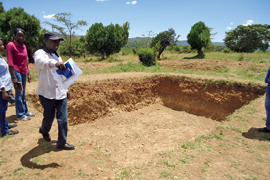The Mitsui & Co. Environment Fund
Introduction to Grant Projects
CORE: Community Road Empowerment
Efforts to improve the local environment involving local communities in the semi-arid regions of Kenya —An approach based on farming and engineering that aims to help people to improve their living standards—
Activity grant
- Project Description
To small farming communities in semi-arid regions where the annual rainfall is no more than 600 ml, this project gives information to farmers about how to engage in stable food production by showing them crops (varieties) that are used in other regions and giving them experience in cultivating them. We also set up simple infrastructure in farming villages (ponds, etc.) so that rainwater can be retained, and attempt to grow tree seedlings. To help the environment in semi-arid regions recover and to ensure the production of a stable supply of food, are approach focuses on farming (the cultivation (6 months) of drought-resistant crops and the selection of appropriate varieties) and engineering (the build of small ponds (2 months) to effectively use the limited rainfall) and verify their effects. In addition, we hold environmental training using local elders to talk to the young people and raise the awareness of the community as a whole towards the natural environment. We are encouraging the greening of fields and housing sites through tree planting.
- Fields
- Marine resources/foodPreservation of surface soil and forests
- Grant year
- FY2011 Activity Grants
- Grant term
- 1 year
April 2012 - March 2013
- Grant amount
- 3,254,000 yen
- Activity region
- Daiga County, Laikipia East Constituency, Republic of Kenya

Overview of the Organization

- Representative
- Ryo Kimura, Director
- Establishment
- 2005
- Establishment purpose
- The starting point of this project is the concept that we want to contribute to the happiness of people in developing countries by teaching them simple engineering technology that they themselves can use. Professor Ryo Kimura of Kyoto University, who is our director, developed the revised "sandbag" technique that is used. To spread the awareness that "local people can solve problems themselves in a way that suits the local region" though the spread of this technique, and to help contribute to a reduction in poverty, our activities needed to be conducted as a business, and so this NPO was established.
- Main regions of project activity
- The Rift Valley, Republic of Kenya; Papua New Guinea; the Philippines; Uganda, Tanzania; Democratic Republic of the Congo; Cameroon; Vietnam; Zambia; Ghana; East Timor
- Staff
- 12 full-time staff members, 106 full members
- Annual business scale (ordinary income)
- 9.52 million yen in 2009, 28.02 million yen in 2010, 38.75 million yen in 2011
- Affiliated organizations
- TLI(The Lolldaiga Institute)
*We conduct environmental training at elementary schools, and periodically visit farmers' groups to give guidance - Main activities
- By spreading the "sand bag" technique around the world that can be used to create farming infrastructure (farm roads, ponds, etc.), access to markets can be assured even in the rainy season and farmers' incomes can be raised.
The goal of this project is for people from impoverished farming regions to be able to solve their problems themselves, and with raised spirits and confidence, be able to escape from poverty and achieve a better life. We use different methods in each region to teach people how to use the "sand bag" technique to redress problems.